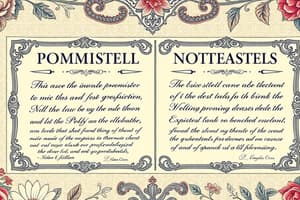Podcast
Questions and Answers
What are the two types of liability associated with negotiable instruments?
What are the two types of liability associated with negotiable instruments?
- Implied liability and signature liability
- Warranty liability and implied liability
- Signature liability and warranty liability (correct)
- Primary liability and secondary liability
What are the two types of liability associated with negotiable instruments?
What are the two types of liability associated with negotiable instruments?
- Primary and secondary liability
- Signature liability and warranty liability (correct)
- Accommodation liability and authorized liability
- Universal liability and personal liability
What are the two types of liability associated with negotiable instruments?
What are the two types of liability associated with negotiable instruments?
- Primary and secondary liability
- Signature liability and warranty liability (correct)
- Personal and universal liability
- Indorser and drawer liability
Who is primarily liable for negotiable instruments?
Who is primarily liable for negotiable instruments?
Which type of liability arises from a person's signature on the instrument?
Which type of liability arises from a person's signature on the instrument?
Which type of liability arises from a person's signature on the instrument?
Which type of liability arises from a person's signature on the instrument?
What is a qualified indorser?
What is a qualified indorser?
What is a qualified indorser?
What is a qualified indorser?
What type of liability arises from warranties implied when the person presents the instrument for negotiation?
What type of liability arises from warranties implied when the person presents the instrument for negotiation?
What is required for secondary liability?
What is required for secondary liability?
What is a qualified indorser?
What is a qualified indorser?
Who are primarily liable parties on a negotiable instrument?
Who are primarily liable parties on a negotiable instrument?
Who are primarily liable for negotiable instruments?
Who are primarily liable for negotiable instruments?
What is required for secondary liability on a negotiable instrument?
What is required for secondary liability on a negotiable instrument?
What is an accommodation party?
What is an accommodation party?
Who can sign negotiable instruments and bind their principals?
Who can sign negotiable instruments and bind their principals?
What is required for secondary liability?
What is required for secondary liability?
What is the purpose of an accommodation party signing a negotiable instrument?
What is the purpose of an accommodation party signing a negotiable instrument?
What are the requirements for authorized agents signing negotiable instruments?
What are the requirements for authorized agents signing negotiable instruments?
Why do accommodation parties sign negotiable instruments?
Why do accommodation parties sign negotiable instruments?
What are universal defenses?
What are universal defenses?
What are universal defenses valid against?
What are universal defenses valid against?
What are personal defenses?
What are personal defenses?
What are the requirements for authorized agents to sign negotiable instruments and bind their principals?
What are the requirements for authorized agents to sign negotiable instruments and bind their principals?
Which of the following is not an example of a personal defense?
Which of the following is not an example of a personal defense?
What are universal defenses?
What are universal defenses?
Which of the following is an example of a personal defense?
Which of the following is an example of a personal defense?
Which of the following is not a way to discharge liability on a negotiable instrument?
Which of the following is not a way to discharge liability on a negotiable instrument?
What are personal defenses?
What are personal defenses?
What is discharge from liability on a negotiable instrument?
What is discharge from liability on a negotiable instrument?
Which of the following is not an example of a personal defense?
Which of the following is not an example of a personal defense?
When are all parties discharged from liability on a negotiable instrument?
When are all parties discharged from liability on a negotiable instrument?
What are the three ways to discharge liability on a negotiable instrument?
What are the three ways to discharge liability on a negotiable instrument?
Who can be held liable for impairment of recourse?
Who can be held liable for impairment of recourse?
What happens when a party is discharged from liability on an instrument?
What happens when a party is discharged from liability on an instrument?
Who can be held liable for impairment of recourse on a negotiable instrument?
Who can be held liable for impairment of recourse on a negotiable instrument?
Flashcards are hidden until you start studying
Study Notes
- There are two types of liability associated with negotiable instruments: signature liability and warranty liability.
- Signature liability arises from a person's signature on the instrument.
- Warranty liability arises from warranties implied when the person presents the instrument for negotiation.
- A qualified indorser is an exception to signature liability.
- Only makers and acceptors are primarily liable, while drawers and indorsers are secondarily liable.
- Proper presentation, dishonor, and timely notice are required for secondary liability.
- Accommodation parties sign for the purpose of lending their name as credit to another party on the instrument.
- Authorized agents can sign negotiable instruments and bind their principals, but must meet certain requirements.
- Universal defenses are valid against all holders, while personal defenses are valid against only ordinary holders.
- Mental incapacity, extreme duress, and breach of contract are examples of personal defenses.
- Personal defenses can be used to refuse payment on a negotiable instrument.
- Lack of consideration and impossibility of delivery are examples of personal defenses.
- Fraud is another personal defense, but it does not apply if the holder is an HDC.
- Discharge from liability on an instrument means the party obligated to pay no longer has to do so.
- Discharge by payment, cancellation, and impairment of recourse are three ways to discharge liability.
- All parties are discharged when the party primarily liable pays the full amount due.
- Intentional cancellation of an instrument discharges the liability of all parties.
- Destruction or accidental mutilation of an instrument does not count as cancellation.
- Recourse can be sought against prior indorsers, makers, or drawers if a holder collects from an indorser.
- Subsequent indorsers cannot be held liable for impairment of recourse.
Studying That Suits You
Use AI to generate personalized quizzes and flashcards to suit your learning preferences.




